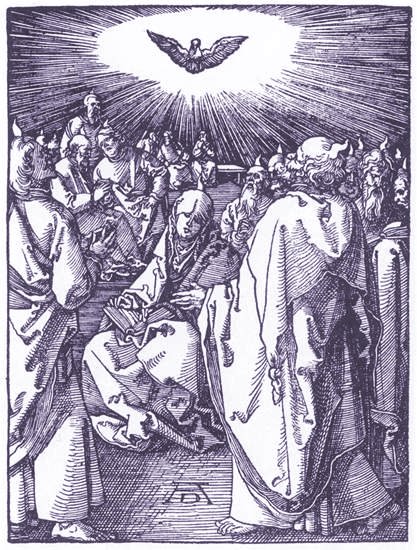HOME | home
Folk Music Index | Christmas Carols | The Celtic Christian Tradition | A Shepherds Songbook | Celtic Christian Links and Lore | Christian Thought | Being 'spiritual but not religious'? | The Ten Commandments | The Good Shepherd | Christian Communities in Peril | Humanism | Jesus and Reason | The Great Fundamentalist Hoax | Why This Scientist Believes in God | My Problem with Christianism | Who Owns Christianity? | Blood Thirsty Christians??? | Birth and Death | Celtic Christians | Celtic Crosses | Women in the Church | Christ by William Dyce | Stobo Kirk | Psalms of David | Saint Clement's Church | Rossyln Chapel | The First Presbyterian Church | Hurlbut Memorial Community Church | Christmas Eve 2009 | Photos of Church Activities | Postcards of Hurbut Church | Hurlbut Photos | Hurlbut Photos 2 | Hurlbut Photos 3 | Pentecost Sunday 2010 | Annual Picnic 2010
Women in the Church
Women In Ministry

What is a woman's role in God's economy? Should women have an active role in the Church? The following verses are important whenever the role of women in the Church is discussed so I'm going to list the verses and then look at some questions that are inevitably asked when looking at this controversial issue. 1 Corinthians 11, 1 Corinthians 14 (esp.vs 34), 1 Timothy 2:11, Titus 2:3.
Looking at history it seems that initially women enjoyed a much greater position in life than was prevalent during the time of the Greco-Roman empire. Even the present day situation does not compare with early Hebrew history where a woman actually led the nation for a time. This is something that even the United States isn't ready to accept!
Early Church history shows that women played a vital role and even with the cultural restrictions they wielded great influence in the Church.
Here are some questions that should be asked when dealing with God's plan for women.
I. Does a woman have a viable purpose in life other than the obvious role of bearing and nurturing children and supporting the husband in his efforts?
A. What if she has no children?
B. What if she is a widow?
C. What if she is not married?
II. Are women always to live under the shadow of Eve, or does the work of Christ redeem women from the curse?
III. Are women to be viewed as servants in our society?
IV. Are women to be considered the property of men? (A view that was/is prevalent in some cultures.)
V. Is there significance in Jesus's selection of the term "bride" to describe the Church and by this designation does He intend that both men and women are to take on the quality of a bride?
A. If men are included in this term "bride", would there ever be a situation where women would be included under a decidedly masculine term?
B. Are we, as men, mere slaves of Christ, or are we considered joint heirs with Christ? Do women fit into this category?
C. Can we make an analogy between Jesus's statement to His disciples that "greatness" comes from a heart that is willing to serve and the fact that godly women are by nature submissive and ready to serve?
VI. Is there a fundamental difference in the way God deals with men and women?
A. Does He have the same standards of holiness, righteousness, and purity for both sexes?
B. Are women treated equally if they sin?
C. Does God chasten women?
D. Are women required to follow the Lord, and if so, are they capable of doing so without the help of men?
E. Are women responsible for their actions if they are in the process of submitting to a male?
VII. Why would God use women to announce the resurrection of Jesus (The most important event in history!) if He thought that they were easily deceived and might not get it right?
VIII. Is the fundamental issue regarding women teaching in the Church, headship, or is it simply not proper for a woman to teach under any circumstances?
A. If the fundamental issue is headship, would it be possible for a pastor or elder to delegate a teaching position to a woman who is qualified? What about a pastoral position?
B. If the fundamental issue is headship, could Jesus Himself call and delegate a teaching position to a woman, (especially if the woman were unmarried or widowed?) What about a pastoral position?
C. Is the fundamental problem in Revelation 2:20 the fact a woman is teaching or the fact that a woman is teaching error?
IX. What should our view be considering the cultural issue? Should we even consider cultural issues when dealing with scripture?
A. What about the issue of slavery? The Bible was written during a period of history when slavery was a way of life, and even Paul mentions the fact that Christians had slaves. The Bible doesn't condemn the practice, so would it be okay for us to have slaves? Should a Christian be condemned for having slaves, even if there is no Bible authority for the condemnation. If the answer is yes, then why? Is the same argument applicable to the church and society today with regard to women?
B. Is Paul's statement in 1Cor. 15:29 meant to be considered in the light of the culture that existed at that time, or is "baptizing for the dead" a practice that should be a part of our modern day church?
When an attempt is made to interpret scripture in the light of the culture and customs that prevailed at the time the passage was written, there is the risk of being accused of trying to take away the Bible's authority and render biblical precepts as irrelevant for our day, but just because some twist scripture for their own ends, does not invalidate the need to consider the cultural background of these passages. Any true exposition of Scripture must take these things into account if the exposition is to be valid.
Should we attempt to wear the same type of clothing style that was worn by those who lived in biblical times? Our present day attire bears no resemblance to those times, should we wear loin cloths, so that we can take literally the command to "gird up our loins"? Should the practice of foot-washing be continued even if we do not live under the same conditions that made that custom popular? Do we insist on "real wine" when we have our communion services, or do we yield to the present day attitude that says it's not proper for a Christian to drink alcohol? Are we disobeying God when we do not adhere to the letter of the word in these issues?
While I'm not suggesting that it would be fundamentally wrong for a Christian or Church to practice wearing loin cloths, use real wine in communion, practice the "foot- washing" tradition, wear the head-covering, etc., I do think that it is wrong to make these cultural issues a basis for Christian fellowship.
Don't get me wrong . . . I do not have a problem if your Church has attempted to find a static equilibrium that existed during biblical times and has attempted to duplicate those conditions. However, I do have a problem with the innuendo that for one to be a Christian, or to be true to God, they must follow you in your attempt to enforce cultural standards that existed during that period (which spans thousands of years, by the way) on the 20th century Church.
To ignore the conditions that prevailed when a verse or passage was written and then apply the verse literally to our present day situation could prove to be a challenge. To be consistent, each example that has been outlined in the Bible would need to be followed, for example the situation outlined in Acts 4-5. Church members should sell their property and live in a communal type atmosphere. Sure, the principle of unselfish sharing should guide us in all of our dealings but should the letter of the word be applied if the same conditions do not currently prevail? If you answer no, then why would you try to use a culturally dependent passage to keep women irrelevant in the function of the assembly?
In 1Cor 7:1, Paul uses the phrase "Now concerning the things of which ye wrote to me:" and jumps in with his answer without giving us the benefit of having the question repeated. We can surmise his question but without the benefit of knowing the prior communication there is the possibility that our conclusions will be flawed. In these types of situations, we cannot always apply the verses in an absolute way.
A similar situation occurs in 2Cor 2:5f. Many believe that Paul is referring to the same person mentioned in 1Cor.5 but there is no way of being absolutely sure. Do we allow those who have been disfellowshipped, and turned over to Satan, back into our midst?
Another example of this can be found in 1Cor 5:9 where obviously the Corinthians had misunderstood a prior statement that he had made in another context, he proceeds to explain further his meaning. If people, to whom Paul wrote, misunderstood him, it shouldn't seem strange to find people, far removed from the culture of that time, who still misunderstand him.
My point is that we must consider that certain verses in the Bible (1Cor 14:34 for example . . . ) may be dealing with information not explicitly expressed.
The Greek culture at that time centered around the goddess Isis. Women were the primary functionaries in this cult and might it be possible that Paul had this in his mind when writing the Corinthian epistle? A situation could have easily arisen where prominent members of the cult converted to Christianity and demanded equal prominence in the function of the Church. This would have spelled disaster for the Corinthian assembly. For a person who knew very little about the Judeo/Christian faith to have a place of prominence (or even exert *any* influence) in the assembly without benefit of being taught and maturing would have effectively doomed the Church. It would be a very rare thing to find a woman in the Corinthian Church who hadn't been steeped in the Isis cult, as it was the major religion of that day. Would this not explain the reason why Paul told the women who had questions about Christianity, to ask their husbands at home and be silent in the Church? Would *you* want a woman to come straight from the cult of Isis and begin to teach a class on theology in a Church that *you* had established?
1Cor 14:34 should be interpreted with the knowledge of these cultural taboos, and not used as a proof text for keeping women from participating in a Church service today. Applying the verse without consideration of the context would mean that women should be prohibited from even singing in the assembly!
In attempting to understand Paul's meaning when he writes concerning the headcovering in 1Cor. 11, it is imperative to know what cultural issues were prevalent at that time. Greek women rarely appeared in public, they lived in strict seclusion. Unmarried women only left the house on special occasions, while married women were mostly confined to "women only" areas. Under these circumstances it would not be very good for women to flaunt their freedom in Christ by discarding the headcovering (worn by the Greeks as a symbol of submission to authority.)
Apparently, the Corinthian women did not see a need to continue this practice (of wearing the headcovering) since they had come to know that in Christ "There is neither Jew nor Greek, there is neither bond nor free, there is neither male nor female: for ye are all one in Christ Jesus." (Galatians 3:28)
Paul however, seemed concerned that this would convey the wrong message to the Greek community, so he appeals to the custom, even though in the Jewish community of ancient times, both men and women went around unveiled. Gen 24:64-65.(Later Jewish authorities however, did insist on the veil.)
Where, if not the Grecian culture, did Paul get the idea that women should pray with their head covered? Did the OT scriptures teach this? He makes his argument *to the Greeks* by appealing to the created order and angels, but even these things don't teach that a woman must have her head covered. He only lends confirmation to societal norms that the Greek culture had erected. (Similar, is the way he dealt with the issue of slavery; requiring the slaves to be obedient and not revolt.)
Paul says "Does not even nature itself teach you, that, if a man have long hair, it is a shame to him?" Where does nature teach this? How could nature teach this? Is he not referring to their own customs with this statement? In fact, in the Hebrew culture, the male *and* female were required to shave their heads to become a Nazarite, and then, afterwards, they were commanded not to cut their hair! Why would God want someone to do something that was against nature? The Nazarite vow was anything but a shame. To take the vows of a Nazarite was considered very honorable in *Israel's society*. (Num 6)
Let's face it, there were many situations in the Church at Corinth that do not prevail today, (such as the problem of eating meat sacrificed to an idol) therefore it is not wise to attempt to use a verse out of it's cultural context to deal with a situation in a modern-day Church.
I say, that we should be a little lenient in the application of certain verses, unless we are faced with the same conditions that prevailed in the Greek/Roman society of Paul's time.
--William Eaton


'Feuch air fear coimhead Israil
Cadal chan aom no suain.'
(The Shepherd that keeps Israel
He slumbers not nor sleeps.)


